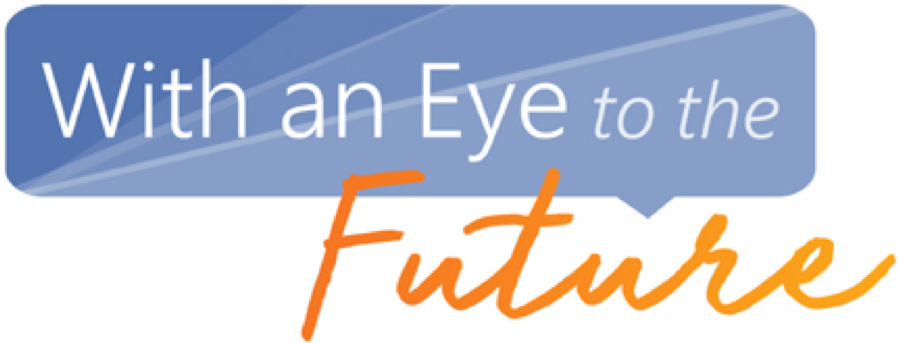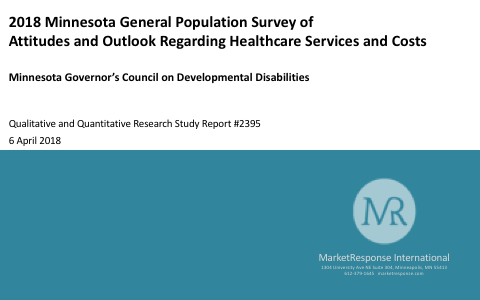2018: Minnesota General Population Survey of Attitudes and Outlook Regarding Healthcare Services and Costs
The Minnesota Governor's Council on Developmental Disabilities released a survey in April that measured the status of healthcare in over 1,000 Minnesota homes, along with current satisfaction ratings with the quality of care they are getting for the costs they are paying. The survey is particularly relevant in that it is a repeat of the same survey done 14 years ago in Minnesota, with the Minnesota Citizens Forum on Health Care Costs, but with some timely updates. The results indicate:
The vast majority of the respondents had some kind of health insurance coverage (92%).
Just over half (56%) of survey respondents have private health insurance through their employer, and another 8% purchased insurance through the Health Insurance Exchange recently. Forty percent (40%) have some kind of government-provided healthcare coverage (21% Medicare, 19% Medicaid); Medicaid coverage has grown from 7% in 2004 to 19% in 2018.
In the words of Minnesota State Senator John Hoffman:
"When this study was first commissioned 14 years ago, a pressing issue was running buses to Canada to buy prescription drugs. In this study, a pressing issue is the high cost of prescription drugs and the need for government oversight."
Most respondents believe healthcare coverage costs are rising, and that it matters.
Two-thirds of Minnesotans (65%) who have any kind of health insurance coverage believe their cost for premiums and additional costs have been going up over the past couple of years; however, these perceptions of rising costs are not as severe as they were in 2004, when 89% of respondents believed the same thing. These perceptions of rising costs made a difference in whether people actually went to the doctor when they thought they needed to.
- Just over one-third of Minnesotans (38%) have delayed medical treatment because of the cost they would have to pay.
- One-half of those who delayed treatment had a serious or somewhat serious condition or illness.
Survey Respondents gave Minnesota a "6.4" out of a possible "9" for Overall Health Coverage and Care.
On a scale of 1-9, with "1" indicating a perception of poor health coverage and care, and "9" indicating excellent health coverage and care, Minnesotans gave their healthcare system an overall average rating of 6.4. That rating is supported by the fact that Minnesotan households expressed more satisfaction than dissatisfaction with many aspects of their healthcare-related experiences.
- For example, respondents seemed mostly satisfied with their ability to be able to choose the healthcare provider they wanted, including specialists, and to get in for an appointment when they wanted, as well as the amount of time they were able to spend with their provider.
- Respondents were most dissatisfied with the amount of money they had to pay for health insurance and prescription drugs, as well as the whole process of pricing, billing and reimbursement for medical services.
Minnesotans perceived the overall quality of the healthcare system in the U.S. to be one full point lower than that of the quality in their own state.
On average, Minnesotans with government-provided healthcare coverage (Medicare or Medicaid) had more positive perceptions of their overall health coverage and care, as compared to Minnesotans with private insurance. This seemed due, in part, to frustrations over confusion related to the billing and payment process, as well as by the "baffling" array of plans available, and uncertainty in how to "navigate the options."
The future of healthcare does not look bright according to 27% of survey respondents.
One-out-of-four respondents (27%) believe they will be worse off in 3 years regarding access to good quality, affordable healthcare. In households with a family member with a developmental disability, this pessimism was particularly pronounced, with respondents indicating fear of potential:
- federal cuts to Medicaid,
- rising costs of healthcare premiums, deductibles and co-pays, and
- decreased access to health insurance and medical services for people with preexisting conditions and disabilities.
As for attitudes on "public or government-run" versus "private" health insurance coverage, Minnesotans are evenly split.
In order to assess Minnesotans' attitudes on government healthcare policies, this question was asked: "Do you think it is the responsibility of the federal government to make sure all Americans have healthcare coverage, or is that not the responsibility of the federal government?"
- Just over half (54%) of all respondents believe the federal government is responsible for ensuring that all Americans have healthcare coverage.
The differences between the yes and the no answers are well characterized with these two quotes from citizens on each end of the attitudinal spectrum.
Yes: Healthcare companies, insurance companies and healthcare providers are not properly incentivized to provide care for everyone. It is expensive and logistically hard to provide healthcare to the poor and people with disabilities. The government needs to make sure that everyone, regardless of whether they need high or low levels of care, have continued access at a price that is not going to make them lose their financial freedom.
No: Healthcare you don't pay for is a handout. Social security payments to individuals who have never paid premiums is a handout. Welfare for individuals who are capable of working is a handout. Money for this does not grow on trees. It comes out of our taxes, insurance premiums, etc.
Minnesotans make recommendations to Congress.
Minnesotans anticipate that federal changes in Medicare and Medicaid are coming, and expressed their opinions on how best to deal with any loss in federal funding. Survey respondents were provided with the following five choices and asked which path Minnesota should choose:
- Reduce rates paid to service providers who are paid with Medicaid dollars,
- Draw funds from other state priorities,
- Raise state taxes to pay for the growth in Medicaid costs,
- Cut services that are currently being offered through Minnesota's Medicaid program, or
- Cover fewer people.
The majority of Minnesota respondents (60%) believe the federal government should continue to "honor the commitment" to match the state's spending for Medicaid, as opposed to putting a limit on federal Medicaid spending.
- If cuts are needed, then the respondents recommended that provider rates be reduced rather than cutting services or covering fewer people.
When it comes to the government's role in the pricing of drugs, the majority of Minnesotans (83%) believe the government should play a role in drug pricing, with 39% believing the government should be very involved in controlling prices.
https://mn.gov/mnddc/extra/customer-research/MN-Healthcare-Attitudes-2018/


